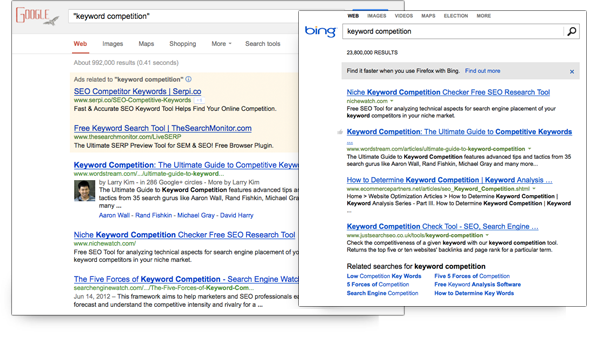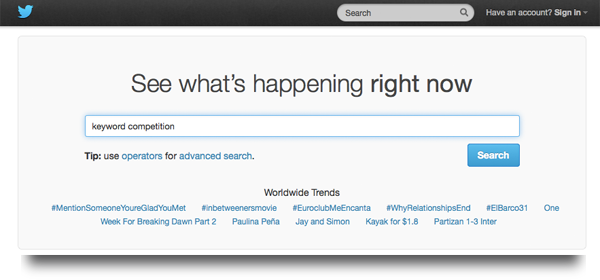Don’t spend any more time on keywords with significant keyword competition
We tend to spend hours upon hours optimizing our sites and articles and rarely give a thought to who’s competing for those same keywords. Competition has gotten fierce since the last Penguin update and it’s more important than ever to check your rankings and try to capitalize on those niche keywords.
So how can you find out who’s competing with you? Think of this article as the research guide for the friendly game of keyword competition. May your best articles out-rank!
Before you begin your quest in keyword competition research, I suggest you create a document to house all of the wonderful data you’ll accrue. Be it a text file or a fancy spreadsheet, you’ll want to have this ready before you begin.
Starting with the engines first

Let’s jump right in and get started. The first way you can see where your keyword competition is coming from is to search for your keywords in the Google and Bing search engines. The results page will hopefully show your article ranked on the first page (contingent on the fact that you’ve been following the Mequoda Keyword Research method).
But if not, you’ll see who did make the cut and that information is very useful. You can see if they were articles, how many comments they had, how many shares they had, how long they were and anything else that could give you an indication of what you’re up against.
Step by step
- Visit Google.com or Bing.com
- Perform a search
- Analyze search results
Pro Tip: Perform a search with quotes around your keyword to display exact term search results. Google likes to mix in relevant keywords in a basic search. By performing an exact search, you’ll narrow your results to just other articles and pages that are targeting your exact keywords.
Deep dives Into tweets

Social networks are a keyword competition researcher’s treasure trove. Twitter in particular is a hotbed for shared articles and links, all of which could be using the same keywords as you. Please note that the data you’ll glean from Twitter won’t present itself to you on a silver platter. You’ll need to dig under the surface to see the fruit of your efforts.
[text_ad]
Strategy
Using Twitter’s advanced search function you’ll search for keyword terms and dive into who and where the tweets take you.
This may seem like a no-brainer: People will tweet about articles and topics that contain your keywords. Sometimes these articles will originate from a competitor’s site. By seeing who’s tweeting and where the links within tweets lead you, you’ll begin to see if competitors are trying to muscle onto your turf. You can also tell if a competitor’s article is being retweeted by a lot of people. You can then extrapolate whether these retweets are part of a campaign or if they have a real viral success on their hands. Then taking it a step further, you can analyze their article structure and content and compare it with your own.
Step by step
- Visit search.twitter.com
- Submit a search query using your keyword
- Investigate tweets
- Collect research
Pro Tip: Take your time and be very methodical with your Twitter research. You’ll notice a lot of spammers, but if you keep searching and making connections to people, companies and articles, you’ll start to get a clearer picture of the who, what, where and why. You might also be tasting a bit of humble pie to find a 20-year old blogger who has more followers and re-tweets than your 50-year old publishing company.
The right tools for the job
You may want to garner more information from your competition by using one of the many online tools available. There is no shortage of them. Below are two tools and the research methods for using them. Most of these tools are paid products. Fortunately those tools that are paid include free trials.
Alexa

Alexa analyzes web traffic to sites and computes a ranking based on popularity. They offer a free tool on their homepage that evaluates keywords and websites.
Strategy
Use Alexa’s free tool to find out what keywords your competition is getting searched for. Please note that Alexa is a very robust service that offers many other data points. In this example we’re using it for a singular purpose.
Step by step
- Visit Alexa.com, and in the search box at the top of the page, type in a competitor’s website url.
- Click on their website within the results page
- On the site info page, click on on the grey search analytics tab
- Beneath the tab on the right side of the page you’ll see the “Top Queries from Search Traffic”
- Use this data to see where your competition is getting search traffic from
Ahrefs

Ahrefs is the “best tool to spy on your competitor’s keywords”. Well, it certainly deserves a mention in this article.
Strategy
Self explanatory: Use Ahrefs to spy on your competitor’s keywords!
Step by step
- Visit ahrefs.com
- Enter a competitor’s URL
- Click the “Search Keywords” button
- Click on the “Keywords” tab underneath the Organic section
- Bask in the glorious data
Pro Tip: Ahref will let you use up to five queries as an unregistered user. Create a free account to get 15 queries per day.
Now that you’ve had your crash course in keyword competition research, do you feel that you’re ready? You will have gobs of data to pour over. Take your time, set yourself up correctly and use your research to optimize articles and pages that you hope will compete for a first-page ranking in the future.
If you’d like to discuss how we can help you create a keyword strategy for your website, contact Ann-Marie Sullivan, our member services manager, and she’ll schedule an opportunity for you to speak with Don Nicholas, our CEO and lead consultant.


